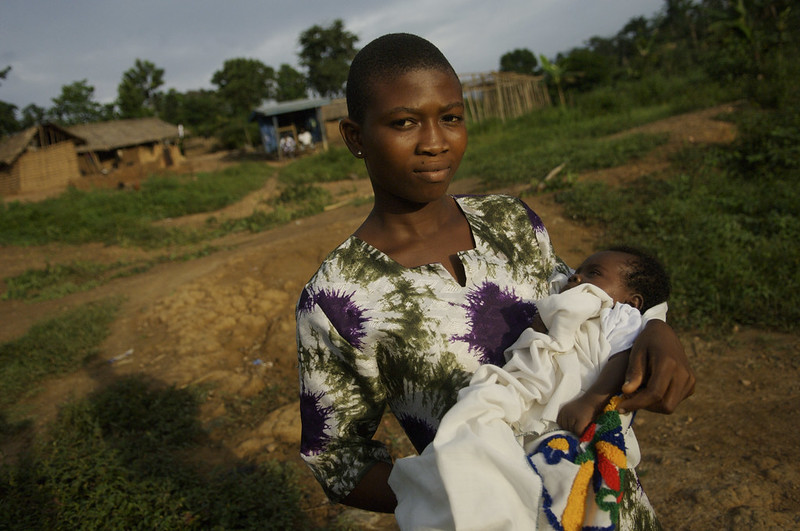Female Genital Mutilation in Ghana

Female genital mutilation (FGM) involves any procedure that removes or causes injury to the external female genitalia and is most frequently performed on young girls in rural, traditional communities. In terms of female genital mutilation in Ghana specifically, the Upper East and Upper West regions note the highest rates of FGM, at 13% and 32.5% respectively for females between 15 and 49, according to the Multiple Indicator Cluster Survey (MICS) 2017/18.
FGM and its Consequences
The World Health Organization (WHO) categorizes FGM into four distinct types, all of which entail unnecessary harm to the female genitalia.
In addition to being incredibly painful and medically unnecessary, FGM has many severe side effects and outcomes. According to a study led by Evelyn Sakeah that BCM Women’s Health published in 2018, short-term effects include bleeding, shock and increased risk of contracting HIV from dirty knives and razor blades used to carry out the procedure. Long-term effects include infections such as urinary and reproductive tract infections, lasting pain during urination and intercourse, menstrual difficulties, keloids, pregnancy complications and ongoing psychological distress.
Despite all of these significant complications, including many others not listed above, and the lack of medical necessity of the procedures, FGM still occurs in these communities.
Obstacles to Ending FGM
Although 94.4% of women between the ages of 15 and 49 believe female genital mutilation in Ghana should end, the brutal practice still continues. Unfortunately, FGM has significant ties to culture and tradition within these rural Ghanaian communities, which makes the procedure difficult to stop outright.
Within these communities, locals view FGM as a critical aspect of teen pregnancy prevention and marriageability. Community members see the removal of external female reproductive organs as a means to reduce sexual activity among girls and prevent premarital sex as communities consider premarital sex extremely taboo. Communities believe that the removal of the clitoris, in particular, decreases sexual sensitivity and arousal, and therefore, decreases the likelihood of sexual engagement, which in turn, prevents teen pregnancy.
Additionally, these communities see FGM as a means of feminization. Society considers the clitoris the feminine equivalent of a penis; communities believe it produces masculine personality traits, such as aggressiveness and anger. As a result of this, the removal of the clitoris is viewed as pivotal to introducing desired feminine traits, such as obedience, to ensure suitors and greater society deem a girl marriageable.
The Good News
Despite the seemingly never-ending battle to end female genital mutilation in Ghana, the country is making significant progress. Between 2011 and 2018, the prevalence of FGM in women aged 15-49 decreased almost twofold to only 2.4%. When breaking down the information further, it became evident that FGM among the youngest age group studied, women aged 15-19, dropped down to only 0.6%.
In 2007, Ghana made an amendment to the Criminal and Other Offenses Act of 1960 to prohibit ‘female genital mutilation’ specifically and increase the severity of penalties. Strong governmental support to end FGM manifests in agencies specifically devoted to ending the practice, such as the Ministry of Gender, Children and Social Protection. This agency organizes events involving local governments and groups that raise awareness about violations of women’s rights and the health implications of FGM. Many other organizations, both governmental and non-governmental, also aim to fight against FGM through tactics ranging from legal action to community education.
Organizations Ending FGM
Two NGOs, 28 Too Many and Orchid Project, combined their unique experiences and expertise in April 2022 to present a more comprehensive, unified front against FGM.
28 Too Many is an England and Wales-based charity that Dr. Ann-Marie Wilson founded in 2010. For more than a decade, Wilson has undertaken extensive research and provided community members and activists with the tools and information to end FGM.
In addition to collecting and interpreting research and data, 28 Too Many also adopts both a top-down and bottom-up approach to ending FGM: engaging with influencers as a means to advocate for change and spread information about FGM and developing advocacy materials and tools that local organizations can easily implement. This two-pronged approach of action and education allows for 28 Too Many to achieve the greatest impact possible.
The Orchid Project is another U.K.-based NGO that Julia Lalla-Maharajh OBE founded in 2011. Lalla-Maharajh OBE built her charity on the premise of partnering, sharing and advocacy. The Orchid Project primarily partners with grassroots organizations around the world, giving them the materials and support necessary to make a larger impact. The NGO shares key knowledge and the practical tools needed to accelerate change while also advocating among governments and global leaders to prioritize the ending of FGM.
Through research, communication and discussion with members of these rural Ghanaian communities, activists are able to glean key information as to why FGM is still occurring, allowing them to better target key community members in a culturally sensitive way and provide better, safer alternative options to prevent teen pregnancy.
– Bryn Westby
Photo: Flickr
